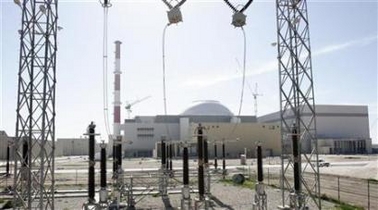Russia delays Iran atomic power plant start-up
(Reuters)Updated: 2007-02-20 10:05
MOSCOW - Russia will delay starting up Iran's first nuclear power plant because Tehran is behind with payments, a Russian atomic industry source said on Monday, as a U.N. deadline neared for Iran to curb disputed nuclear activity.
 A general view shows the nuclear power plant in Bushehr, about 1,215 km (755 miles) south of Tehran, Iran February 26, 2006. Russia will delay the building of Iran's first nuclear power plant as Tehran is behind with payments, a Russian atomic industry source said, as pressure grew on Tehran to curb its disputed nuclear activity.s [Reuters] |
In Tehran, a senior Iranian official denied any payment holdup, saying Iran had adhered precisely to contract terms with Moscow over the Russian-built plant at Bushehr.
Word of the setback for the project came as Iran hurriedly arranged talks on Tuesday with the International Atomic Energy Agency just ahead of an IAEA report that could expose Tehran to broader sanctions over its disputed nuclear program.
Iran's security council chief Ali Larijani will meet IAEA director Mohamed ElBaradei, who in a report to the U.N. Security Council later this week is expected to confirm that Tehran has defied a 60-day council deadline to stop enriching uranium.
Separately, ElBaradei said in a published interview Iran would be able to install 3,000 centrifuges as the basis for "industrial scale" enrichment in six-12 months.
Gholamreza Aghazadeh, head of Iran's atomic energy agency, is aiming for swifter installation -- one cascade (unit) of 164 centrifuges per week, according to a report by developing nation diplomats briefed by him when they visited Iran two weeks ago.
ElBaradei told the Financial Times it was too late for the world to deny Iran enrichment know-how, meaning that only diplomatic compromise, not sanctions, could resolve the crisis.
Western powers suspect Iran is secretly seeking atomic weapons, not just the civilian nuclear energy it says it wants.
Diplomats monitoring IAEA inspections have said Tehran has set up at least 2-3 cascades in the underground Natanz plant in recent weeks and is poised to switch them on for feeding with uranium for refinement into fuel at any time.
A source in Russia's nuclear power agency Rosatom told Reuters it was obvious the timetable for the Bushehr plant needed to be "corrected" because Tehran had not made payments for the work for more than a month.
Moscow had been due to start nuclear fuel deliveries for the plant in March, ahead of the reactor's planned September start. It was unclear how long the delay would be. Moscow has already pushed back completion several times, citing technical reasons.
U.N. SANCTIONS START BITING
Atomstroiexport, the Russian state company in charge of the Bushehr work, said existing U.N. sanctions against Iran were also contributing to the delays because of a trading ban on certain atomic equipment.
"There are certain obstacles affecting our work in Bushehr," said spokeswoman Irina Yesipova. "Because of the embargo a number of third countries declined to supply equipment (to Iran). That's why Russian producers have to provide all the equipment all of a sudden. It's a tough situation."
Washington wants Moscow to stop building the Bushehr plant altogether, believing it is encouraging Iran's bid to master uranium enrichment technology, the issue at the heart of Tehran's nuclear dispute with the West.
ElBaradei told a London conference on Monday that Western powers needed to reassure Tehran over its own security rather than just ratchet up international sanctions.
"Iran feels insecure. They live in a neighborhood which is not the most friendly," he said, noting that Pakistan and Russia both have nuclear weapons. "There are grievances between Iran and the West. You have got to address the security issue."
The Council on December 23 banned transfers of technology and expertise to Tehran's nuclear program. ElBaradei said he expected those sanctions to be toughened if Iran refused to halt enrichment.
Larijani and ElBaradei were expected to meet on Tuesday afternoon at an undisclosed location in Vienna, officials said.
"Larijani might come with some positive news, but that's speculation. No one really knows," said a European diplomat.
Tehran has said it will not heed the Council's 60-day deadline, vowing to press ahead with plans to upgrade research-level enrichment into "industrial scale" production.
The IAEA has been issuing reports on Iran for three years and Iran has often sought last-minute talks with top IAEA officials before a report to try and blunt its impact.
|
||
|
||
|
|